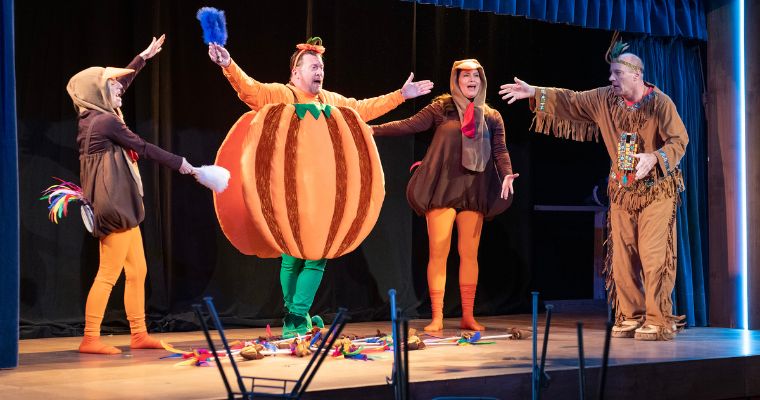
Jeni Hacker, Stephen G. Anthony, Anna Lise Jensen, and Tom Wahl, in "The Thanksgiving Play," at GableStage in the Biltmore Hotel, Coral Gables, through Dec. 10. (Photo by Magnus Stark)
You, dear reader, are living on stolen land.
When you hear or read that, how does it make you feel?
If you’re at least somewhat disturbed or want to learn more or do something, Native American playwright Larissa FastHorse has you where she wants you. In other words, by admitting that you live on stolen land, you concede that you are partially complicit in the erasure of indigenous peoples, their lands, their stories, and their experiences.
But if you wish to take a step further, you might consider experiencing FastHorse’s popular satirical, clever, hilarious and daring comedy, “The Thanksgiving Play.” It presents a version of the Thanksgiving story that hardly involves the whitewashed version of Pilgrims and Native Americans happily and peacefully breaking bread with each other.
GableStage, who just won numerous Carbonell Awards for its summer production of "Native Gardens," and whose mission it says is to confront today’s issues, is giving the piece its regional premiere in production that captures the satiric tone of the work.
Its playful and credible, taut yet layered, and runs about 90 minutes without an intermission. The production is on stage through Dec. 10 in GableStage’s playing space at the Biltmore Hotel in Coral Gables.
In addition to the live, in-person production, GableStage is offering audiences the chance to stream the production from Nov. 24-Dec. 10.
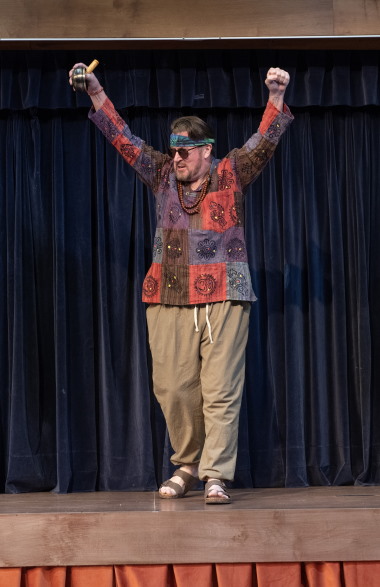
Stephen G. Anthony as Jaxton in GableStage's production of "The Thanksgiving Play." (Photo by Magnus Stark)
From smart directing and acting choices to solid design work, all members of the company work as one cohesive unit to convey director Bari Newport’s vision.
Truly, performers Stephen G. Anthony, Jeni Hacker, Anna Lise Jensen, and Tom Wahl look and sound as though they are having a blast on stage. And, to their credit, nothing seems forced.
Rather, they sincerely portray the characters and let the comedy arise naturally from their earnestness in the roles.
There are times in FastHorse's play when some over-the-top playfulness and biting satire are necessary. But other moments call for more nuanced, subtle expressions. These talented actors, who are likely familiar faces to regular South Florida theatergoers, nail the bigger moments and those that call for more subtlety. The cast shines under Newport’s careful direction and expert pacing and staging.
Meanwhile, the actors have a wide, detailed, and realistic-looking space on which to perform and move about freely. That is true thanks to scenic designer Frank J Oliva’s work. And lighting designer Tony Galaska illuminates that space realistically, befitting this realistic piece.
“The Thanksgiving Play” recently had a Broadway production. It made FastHorse the first known Native American female playwright to have her show appear on the Great White Way.
"The Thanksgiving Play" has been one of the most produced works in live theater since its opening in 2018.
In the work, good intentions collide with absurd assumptions. The collision happens as a troupe of terminally “woke” teaching artists scramble to create a politically-correct pageant for elementary school students. Troupe members want the piece to celebrate Thanksgiving and Native American Heritage Month without offending anyone.
The problem is, in the well-meaning white characters’ struggle to be inclusive, and to prove how woke they are, the educators begin to remove all Native-ness from their play.
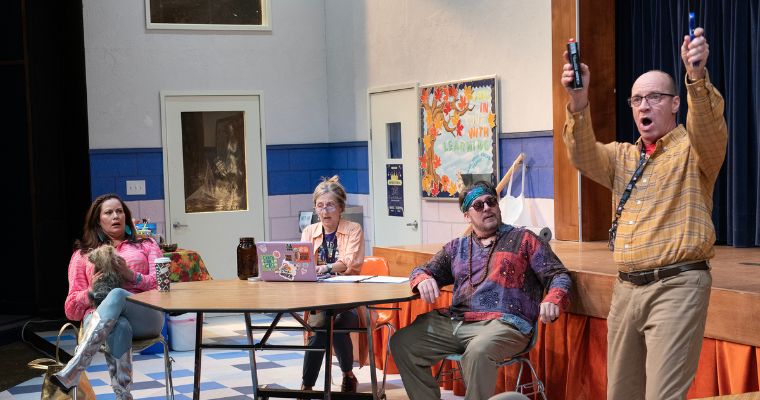
From Left to Right, Anna Lise Jensen, Jeni Hacker, Stephen G. Anthony, and Tom Wahl, on "The Thanksgiving Play".
FastHorse's sharply-written piece deconstructs, skewers, stimulates, provokes, and tickles the funny bone. In addition, it celebrates live theater with useful, good-natured reminders about the artform.
Of course, you do not have to be a theater fan to appreciate the theatrical references. And, certainly, you don’t have to be a scholar of Native American studies to take something valuable away from FastHorse’s mind stimulating and awareness raising play.
In fact, you may be able to identify with the character of Alicia. That is, if your past experiences with Thanksgiving were anything like hers. Consider:
Logan: Alicia, what were you told about the first Thanksgiving in your family?
Alicia: Well, not much really. I mean, we aren’t religious or anything.
Jaxton: Of course not.
Alicia: We just ate food and watched games. We didn’t talk about it much.
Logan: Maybe we could do something with that? Use play as a universal way to connect with the kids instead of those tired children’s songs we make them sing every year.
But Alicia is not who the others think she is. Actually, the reveal is a plot twist that FastHorse offers well into the play. Of course, no spoilers here. Instead, we’ll just say that the lack of actors and other artists representing specific ethnicities is an issue in the performance world. And FastHorse satirically points out the shortage.
For the brevity of the play, FastHorse covers a lot of material. Undoubtedly, this is a meaty play. And while there are subplots, they do not detract from the heart of the piece.
In “The Thanksgiving Play,” FastHorse also asks pointed questions about wokeness, authorship, and erasure. She also tackles topics ranging from historical stereotypes about race to the historical treatment of women as objects of sex and outer appearance to well-meaning liberals who say the right things but don’t take action to bring about change. Actually, it is their good intentions, rather than their bad traits, that may bother us most. Ironically, in their efforts to be inclusive, they end up excluding material – and people – from their skit.
In “The Thanksgiving Play,” such well-meaning folks are the characters trying their darndest to create a fun, entertaining and respectful play in honor of Thanksgiving and Native American Heritage Month.
There’s Logan (Hacker), a high school drama teacher who is a vegan and used to live in Los Angeles to find work as an actor. However, her ambitions have led her to bigger things, such as teaching high school students live theater and directing high school productions. But Logan does not just settle for directing plays that you might expect high schoolers to perform. For instance, Logan tried to stage a high school production of Eugene O’Neill’s “The Iceman Cometh.”
“I’ve seen every show you’ve directed since you got to Jefferson High,” says Caden, played by Tom Wahl. “ 'The Iceman Cometh’ was made so much more relevant with 15-year-olds.”
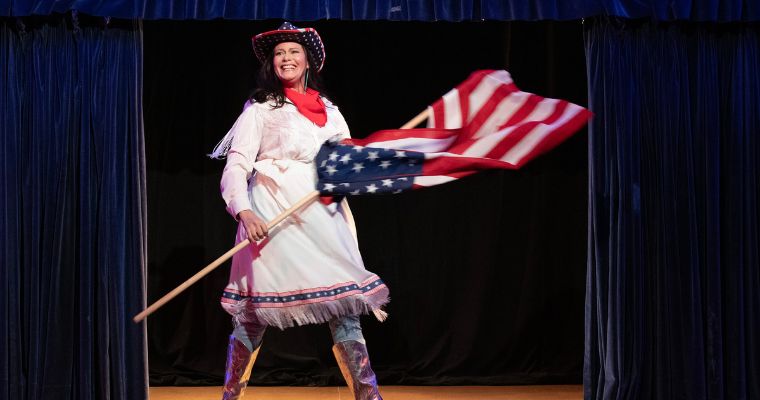
Anna Lise Jensen as Alicia in playwright Larissa FastHorse's enlightening and as entertaining “The Thanksgiving Play.” (Photo courtesy of Magnus Stark)
By the way, 300 parents signed a petition to fire Logan after the school board shut down the production, deeming it inappropriate for high school drama students.
Wahl, as Caden, says the aforementioned line sincerely enough that we sense the sarcasm behind the remark.
Caden is an enthusiastic elementary school history teacher. Also, he has dramatic aspirations but no experience.
“Caden was generously assigned to us by the school district as our history specialist,” Logan explains to her fellow educators.
The group also includes Jaxton (Anthony), a yoga practitioner and actor. “He’s that confident guy everyone loves, but his logical PC thinking takes weird turns,” reads a description of his character in FastHorse’s script.
Last but not least, there is Alicia (Jensen), hired by Logan who believes that she has Native American heritage.
“You’re a fan of my work?” Alicia asks Jaxton.
“More than a fan,” he replies. “I’m a devoted follower.”
Alicia responds: “That’s sweet. I just opened a new Instagram account. You should follow that one too.”
Alicia is simple, beautiful but not too bright. And her simplicity serves as the source of some of the play’s abundant humor.
During most scenes, the characters work on creating their skit. Whether they argue or agree with each other, it is clear that these folks harbor the best of intentions. But they are also the well-meaning white folks that FastHorse, a Sicangu playwright, has said she wishes to target for “performative wokeness.”
In addition to the main scenes, the piece includes interludes. They feature "those tired children’s songs” alluded to earlier in this review. In her script, FastHorse notes that these scenes “are sadly inspired by the Internet, mostly current teachers’ Pinterest boards.”
The playwright urges actors to “play with the theatricality of these scenes; perhaps children perform them, perhaps puppets, perhaps the actors as children, perhaps video, perhaps anything. Have fun.”
GableStage’s cast members do have fun as they playfully, like children and with eye-popping costumes and props, sing songs to melodies that you are likely familiar with, such as “The Twelve Days of Christmas.” And you never know what visual surprises you’ll find during these scenes.
Wahl is endlessly playful and upbeat as Caden, the elementary school history teacher and aspiring playwright. With copious amounts of energy and a bright expression on his face, Wahl brings to mind an elementary teacher or librarian who reads to children in a highly dramatic voice and with expressive gestures.
Wahl has expertly played serious characters, such as one of 12 jurors tasked with deciding whether a man lives or dies in Palm Beach Dramaworks’ stellar production of “Twelve Angry Men.” If you saw Wahl in that production, he is unrecognizable here as a fun-loving, even silly individual who does not seem in the least shy about being conspicuous by making funny sounds.
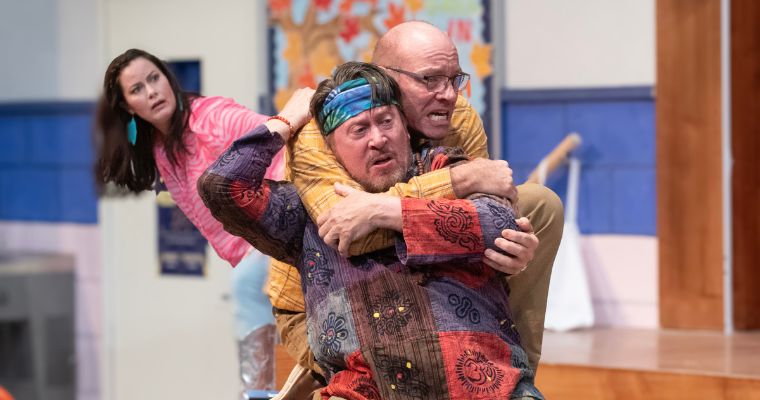
Anna Lise Jensen as Alicia is horrified as Tom Wahl as Caden chokes Stephen G. Anthony as Jaxton, in “The Thanksgiving Play” at GableStage in the Biltmore Hotel, Coral Gables, through Sunday, Dec. 10. (Photo by Magnus Stark)
The cast’s standouts also include Anthony. The actor, clad in sunglasses and a headband, looks and sounds cool, confident, and hip as the yoga practitioner whom Logan dismisses as a “street performer,” pitting high art against low art. Anthony manages to make his character confident without coming across as arrogant, yet he's calm and peaceful as he practices yoga poses and sounds.
Hacker, who has excelled in a variety of roles, is triumphant as Logan. The performer, her hair mussed, portrays the hapless drama director as a tireless, ambitious go-getter who runs from one place to another, a strand of hair draped over her forehead and shifting as she moves quickly about the stage. In addition, Hacker makes us keenly sense the frustration that comes gushing out of her when things do not go her way.
In her script, FastHorse calls for “a high school drama classroom.” But as designed for GableStage’s production, Oliva's space looks more like a cafetorium or auditeria. The wide set includes an audeteria or cafetorium stage, which the actors often stand on.
This allows Newport to highlight the actors. In addition to the stage, a variety of posters and signs highlight the accomplishments of students at the fictional school. From homecoming royalty to “competitive investing,” it’s clear that the student body is diverse in its accomplishments. Of course, there are plenty of banners highlighting the students’ dramatic accomplishments. Galaska’s design includes impressive detail, such as a sign by a water fountain that reads “out of order – slow the spread" (obviously referring to COVID).
Toward the end of “The Thanksgiving Play,” Logan announces that Caden “will have an added credit of dramaturg.”
“Dramaturg? The holy grail of American theater titles,” Caden responds.
“What is that” Alicia retorts.
“No one knows,” Caden replies.
But ask GableStage's resident dramaturg, Karina Batchelor. Yes, GableStage employs a dramaturg who mixes “her teaching expertise with her artistic vision to help facilitate and deepen the understanding of GableStage’s current season and beyond,” according to company.
In the production’s program, she has included books that you might consider to increase your knowledge about Native Americans. The website americanindian.si.edu might help as well.
GableStage’s production of “The Thanksgiving Play” runs through Dec. 10 at the theater inside the Biltmore Hotel, 1200 Anastasia Ave. in Coral Gables. Tickets range from $35-$65. For more information, call the box office at 305-445-1119 or www.gablestage.org.




